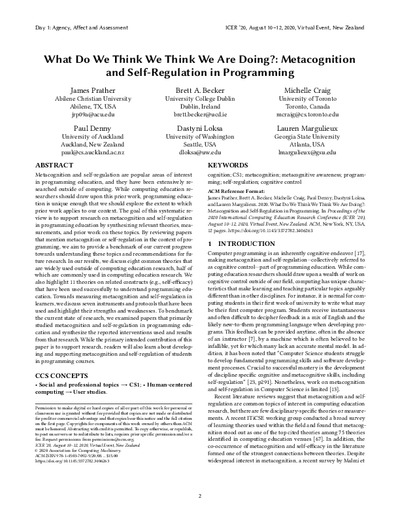What Do We Think We Think We Are Doing?Metacognition and Self-Regulation in Programming
Publikationsdatum:
Zu finden in: ICER 2020 (Seite 2 bis 13), 2020
|
 |
 Diese Seite wurde seit 2 Jahren inhaltlich nicht mehr aktualisiert.
Unter Umständen ist sie nicht mehr aktuell.
Diese Seite wurde seit 2 Jahren inhaltlich nicht mehr aktualisiert.
Unter Umständen ist sie nicht mehr aktuell.
 Zusammenfassungen
Zusammenfassungen
Metacognition and self-regulation are popular areas of interest in programming education, and they have been extensively researched outside of computing. While computing education researchers should draw upon this prior work, programming education is unique enough that we should explore the extent to which prior work applies to our context. The goal of this systematic review is to support research on metacognition and self-regulation in programming education by synthesizing relevant theories, measurements, and prior work on these topics. By reviewing papers that mention metacognition or self-regulation in the context of programming, we aim to provide a benchmark of our current progress towards understanding these topics and recommendations for future research. In our results, we discuss eight common theories that are widely used outside of computing education research, half of which are commonly used in computing education research. We also highlight 11 theories on related constructs (e.g., self-efficacy) that have been used successfully to understand programming education. Towards measuring metacognition and self-regulation in learners, we discuss seven instruments and protocols that have been used and highlight their strengths and weaknesses. To benchmark the current state of research, we examined papers that primarily studied metacognition and self-regulation in programming education and synthesize the reported interventions used and results from that research. While the primary intended contribution of this paper is to support research, readers will also learn about developing and supporting metacognition and self-regulation of students in programming courses.
 Dieses Konferenz-Paper erwähnt ...
Dieses Konferenz-Paper erwähnt ...
 Personen KB IB clear | Zachary Albrecht , Doug Baldwin , Brett A. Becker , Monique Boekaerts , Jonas Boustedt , Maxine Cohen , Wanda Dann , Paul Denny , Anna Eckerdal , Stephen H. Edwards , Barbara J. Ericson , Mark Guzdial , Arto Hellas , Kayla Holcomb McMurry , John Homer , Peter Hubwieser , Andrew Jensen Ko , Päivi Kinnunen , Juho Leinonen , Leo Leppänen , Dastyni Loksa , Lauri Malmi , Murali Mani , Linda Mannila , Joshua Martin , Krista Masci , Quamrul Mazumder , Robert McCartney , Jan Erik Moström , Andreas Mühling , Thomas L. Naps , Lars-Åke Norden , Miranda C. Parker , Arnold Pears , Alani Peters , Raymond Pettit , Paul R. Pintrich , James Prather , Kantwon Rogers , Alexander Ruf , Kate Sanders , Clifford A. Shaffer , Judy Sheard , Simon , Jane Sinclair , Lynda Thomas , Laura Toma , Paul T. Tymann , Jan Vahrenhold , Carol Zander , Moshe Zeidner | |||||||||||||||||||||||||||||||||||||||||||||||||||||||||||||||||||||||||||||||||||||||||||||||||||||||||||||||||||||
 Begriffe KB IB clear | cognitive load theory (CLT)
, Metakognitionmetacognition
,  Programmieren Programmieren programming
, Selbstwirksamkeitself efficacy
, Verstehenunderstanding programming
, Selbstwirksamkeitself efficacy
, Verstehenunderstanding
| |||||||||||||||||||||||||||||||||||||||||||||||||||||||||||||||||||||||||||||||||||||||||||||||||||||||||||||||||||||
 Bücher |
| |||||||||||||||||||||||||||||||||||||||||||||||||||||||||||||||||||||||||||||||||||||||||||||||||||||||||||||||||||||
 Texte |
|
 Zitationsgraph
Zitationsgraph
 Zitationsgraph (Beta-Test mit vis.js)
Zitationsgraph (Beta-Test mit vis.js)
 Zeitleiste
Zeitleiste
 Anderswo finden
Anderswo finden
 Volltext dieses Dokuments
Volltext dieses Dokuments
 |  What Do We Think We Think We Are Doing?: Fulltext at the ACM Digital Library ( What Do We Think We Think We Are Doing?: Fulltext at the ACM Digital Library ( : :  , 1666 kByte; , 1666 kByte;  : :  ) ) |
 Anderswo suchen
Anderswo suchen 
 Beat und dieses Konferenz-Paper
Beat und dieses Konferenz-Paper
Beat hat Dieses Konferenz-Paper während seiner Zeit am Institut für Medien und Schule (IMS) ins Biblionetz aufgenommen. Beat besitzt kein physisches, aber ein digitales Exemplar. Eine digitale Version ist auf dem Internet verfügbar (s.o.). Es gibt bisher nur wenige Objekte im Biblionetz, die dieses Werk zitieren.
 Biblionetz-History
Biblionetz-History 
default2
default3



















 QR-Code dieser Seite
QR-Code dieser Seite